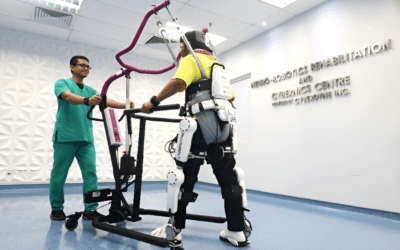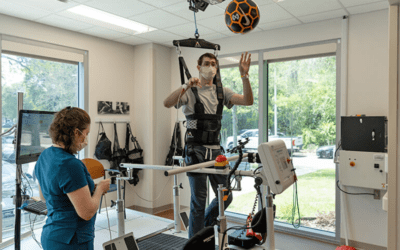We understand the impact that sleep disorder rehabilitation can have on improving the quality of life for people with insomnia, especially when it’s related to neurological conditions. Getting a good night’s sleep is important for our overall physical and mental health, but many people struggle with this. Using advanced technology-enabled therapies, we offer personalised and predictive solutions for preventing sleep disorders and treating insomnia.
This represents a significant step forward in managing these conditions.
In this article, we will explore the underlying neurological causes of insomnia and the pivotal role of neurotransmitters in sleep regulation. We will delve into the effectiveness of Non-Invasive Brain Stimulation for Insomnia, among other neuromodulation techniques, as part of our holistic approach to sleep disorders rehabilitation.
Additionally, we will discuss the importance of sleep hygiene techniques and lifestyle changes that can further support individuals in their journey toward improved sleep. Join us as we navigate the intricacies of sleep apnoea therapy and other innovative solutions that herald a new era in the field of sleep medicine.
Understanding Insomnia

Insomnia is characterised by difficulty initiating or maintaining sleep, waking up too early, and experiencing non-restorative sleep despite having the opportunity to sleep, which significantly impacts daily functioning. This condition is prevalent, affecting about 30% of the general population, with 10-18% considering their sleep problems severe and chronic. Women are more frequently affected than men, and the incidence increases with age.
Definition and Prevalence of Insomnia
Insomnia involves persistent sleep difficulties despite adequate sleep opportunities, leading to daytime dysfunction. It is often secondary to or comorbid with neurological diseases. Neurological conditions such as Parkinson’s disease, epilepsy, and neuromuscular disorders can disrupt sleep patterns and are common causes of insomnia.
Symptoms and Diagnosis of Insomnia
Neurological symptoms like motor deficits, along with co-morbidities such as pain, depression, and anxiety, can exacerbate sleep difficulties. Certain medications used to treat these conditions may also contribute to insomnia. Diagnosis requires careful consideration of these factors to differentiate primary from secondary insomnia.
Impact on Quality of Life
Insomnia significantly reduces quality of life, affecting cognitive functions, physical health, and overall well-being. It is crucial to address these impacts comprehensively in diagnosis and treatment to improve life quality for those afflicted.
Neurological Causes of Insomnia
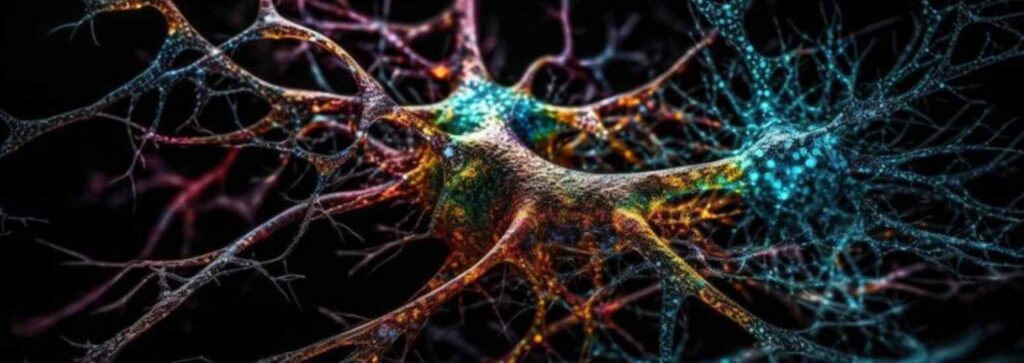
Restless Legs Syndrome
Restless Legs Syndrome (RLS) is characterised by uncomfortable sensations in the legs, often described as itching, crawling, or tingling, which intensify during rest or inactivity, particularly at night. This condition is prevalent in Parkinson’s disease (PD) patients and can significantly disrupt sleep by causing difficulties in sleep onset and maintenance. Treatment options include dopaminergic medications and lifestyle modifications aimed at alleviating symptoms.
Parkinson’s Disease
Parkinson’s Disease is strongly linked with various sleep disturbances, including Restless Legs Syndrome and REM Sleep Behaviour Disorder (RBD). RBD can predate Parkinson’s motor symptoms and is considered a significant biomarker for the disease. Parkinson’s medications, particularly dopamine agonists, are known to cause excessive daytime sleepiness and sudden sleep onset, which can affect overall sleep quality.
Alzheimer’s Disease and Dementia
Sleep disturbances are common in Alzheimer’s Disease (AD) and can exacerbate cognitive decline. Insomnia in AD patients is associated with an increase in amyloid-beta peptides, which are crucial in the disease’s progression. Managing sleep disturbances in dementia is critical, often involving non-drug treatments and medication to improve sleep quality and reduce nighttime awakenings.
Epilepsy and Neuromuscular Disorders
Epilepsy is associated with a variety of sleep disorders. Seizures during sleep can profoundly affect sleep architecture and reduce sleep efficiency, leading to increased daytime sleepiness. Additionally, antiepileptic drugs can alter sleep patterns and contribute to sleep disturbances. Neuromuscular disorders also play a role in sleep disruption due to respiratory muscle weakness, which can lead to nocturnal hypoventilation.
Impact of Neurotransmitters on Sleep
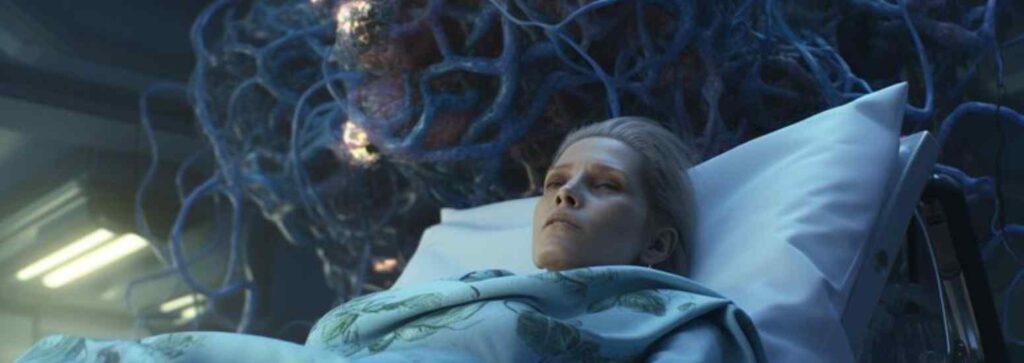
Role of Gamma-Aminobutyric Acid (GABA)
Gamma-aminobutyric acid (GABA), the primary inhibitory neurotransmitter, plays a crucial role in promoting sleep by increasing chloride ion conductance, which leads to neuronal inhibition. Most sedative drugs target GABAA receptors to enhance this inhibitory effect, aiding sleep induction. Additionally, GABAergic neurons in the ventrolateral preoptic nucleus actively inhibit wake-promoting centres, facilitating the onset and maintenance of sleep.
Impact of Acetylcholine
Acetylcholine is instrumental in regulating REM sleep, with neurons in the brainstem and basal forebrain becoming active during this phase. This neurotransmitter helps maintain the brain’s activated states during wakefulness and REM sleep, contributing to the sleep architecture.
Cortisol and its Effects
Cortisol, often linked with stress, significantly influences sleep by regulating the sleep-wake cycle. High cortisol levels disrupt sleep, increasing wakefulness at night and impacting sleep quality. Chronic elevation or depletion of cortisol, as seen in conditions like Cushing’s and Addison’s disease, can profoundly affect sleep patterns.
Serotonin’s Role in Sleep Regulation
Serotonin, known for mood regulation, also affects sleep cycles. It promotes sleep by its action in the raphae nuclei of the brainstem during wakefulness. Serotonin’s complex role in enhancing sleep quality and regulating sleep timing underscores its importance in sleep-wake homoeostasis.
Insomnia Treatment Options and Lifestyle Changes

Medications for Insomnia
We at the Neuromodulation Centre understand the complexities of sleep disorders and offer various medication options tailored to individual needs. For those struggling with staying asleep or waking too early, options like Doxepin hydrochloride and Eszopiclone are recommended . Additionally, for conditions like restless legs syndrome, medications such as gabapentin enacarbil and pramipexole are effective.
Cognitive Behavioural Therapy
Cognitive Behavioural Therapy for Insomnia (CBT-I) is a cornerstone of our treatment approach, focusing on changing sleep habits and reducing sleep-related anxiety. This therapy includes techniques like stimulus control and restriction to improve sleep patterns.
Bright Light Therapy for Insomnia
Bright light therapy resets the body’s internal clock to manage circadian rhythm disorders. It is particularly effective for conditions like delayed sleep phase syndrome and can be adjusted to fit the patient’s specific sleep schedule.
Lifestyle Modifications and Tips for Sleep Disorder
Simple lifestyle changes can significantly enhance sleep quality. We recommend reducing caffeine intake, maintaining a regular sleep schedule, and creating a restful sleeping environment. These modifications are often the first line of defence in treating insomnia and can be very effective when combined with other treatments.
Conclusion
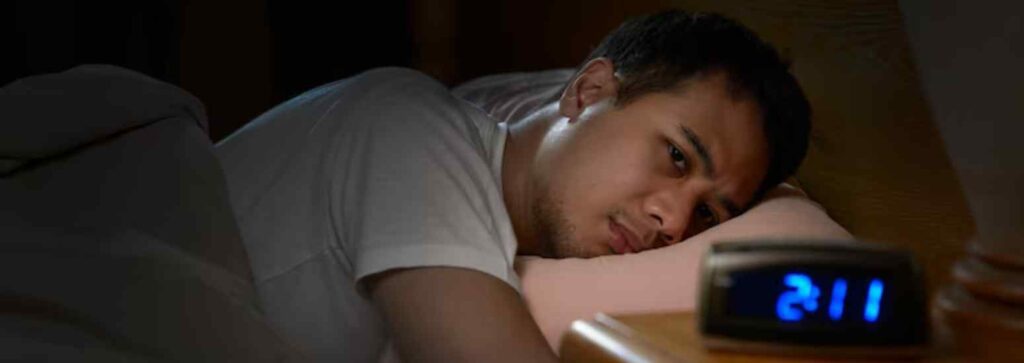
Throughout this article, we have explored the complex interplay between neurological conditions and insomnia, highlighting the importance of a targeted approach to sleep disorder rehabilitation. Integrating advanced neuromodulation therapies alongside the critical aspect of sleep hygiene and lifestyle modifications offers a comprehensive pathway to enhancing sleep quality and, by extension, overall well-being. The significance of neurotransmitters in regulating sleep patterns underscores the necessity for personalised treatment plans, which can pave the way toward a more restful and rejuvenating sleep experience for those afflicted by neurological conditions and their resultant sleep disturbances.
In recognising the intricate nature of sleep and its profound impact on individuals’ health, we stress the value of ongoing research and the development of innovative treatment methodologies. The potential to improve lives through such specialised care is immense, alleviating insomnia and addressing the broader spectrum of neurological ailments. For individuals seeking deeper insights or assistance in navigating the complexities of sleep disorders, connecting with our Neuromodulation Centre could be a pivotal first step towards recovery and improved quality of life. To know more about the topic, please connect with us today.

